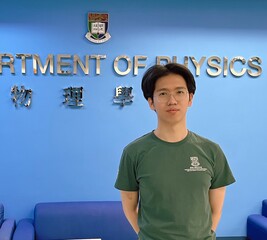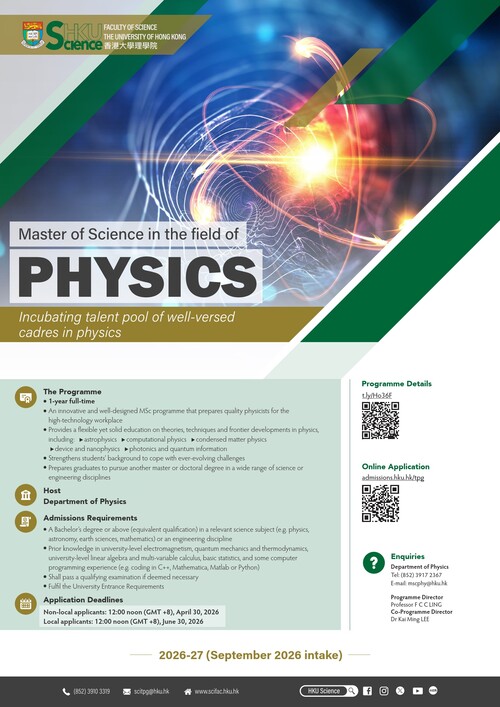The Department of Physics is offering a Taught Postgraduate Master of Science in the field of Physics. This is an innovative and well-designed MSc programme which aims to further equip university graduates with physics or related backgrounds for various career pathways and for coping with ever-evolving challenges. Our programme emphasizes a balanced and flexible approach, it provides students an opportunity to learn a wide range of advanced topics in theoretical, computational and experimental physics via taught courses and a capstone research project. Through the systematic postgraduate training in selective subject areas including astronomy, condensed matter physics, device and nano-physics, photonics and quantum information science, students can deepen and broaden their understanding of physics, and gain transferable skills for both fundamental research and career prospects.
Admission Requirements
To be eligible for admission to the programme, you should have:
- A Bachelor's degree of this University, or an equivalent qualification;
- A Bachelor's degree in a relevant science subject (e.g. Physics, Astronomy, Earth Sciences, Mathematics) or an Engineering discipline;
- Prior knowledge in university-level electromagnetism, quantum mechanics and thermodynamics, university-level linear algebra and multi-variable calculus, basic statistics, and some computer programming experience (e.g. coding in C++, Mathematica, Matlab or Python);
- Applicants shall pass a qualifying examination if deemed necessary;
- Fulfil the University Entrance Requirements.
For 2026-27 intake:
Application opens on November 7, 2025. The closing dates for non-local and local applications are 12:00 noon (GMT +8), April 30, 2026 and 12:00 noon (GMT +8), June 30, 2026 respectively. Applications can be submitted via our on-line application system here.
For non-local students, they are advised to apply as early as possible to ensure completing all entry visa requirements prior to the commencement of the programme (It may take up to 3 months to process the entry visa).
Frequently Asked Questions (FAQ) for the Master of Science in the field of Physics Programme
(Please read the FAQ before making an application)
► Articulation Pathways to HKU Science Full-time Taught Postgraduate Programmes
Fees for 2026-27 intake:
The composition fee for the full-time programme for 2026-27 intake will be HK$200,000#. The fee shall be payable in two instalments over one year.
In addition, students are required to pay Caution Money (HK$350, refundable on graduation subject to no claims being made) and Graduation Fee (HK$350). With effect from 2022-23, all full-time students will be charged a student activity fee of HK$100 per annum to provide support for activities of student societies and campus wide student events.
# Subject to approval
Programme Highlights
- English as the medium of instruction
- 1 year (full-time)
- Emphasizing a balanced and flexible approach, with a strong focus on catering to the academic and career aspiration of students, developing their own specialty in subject knowledge and technical skills
- Solid education on theories, techniques and frontier developments in different sub-fields in physics including the five fields of specialization: astrophysics, computational physics, condensed matter physics, device and nanophysics, photonics and quantum information
- Highly valued by many employers for MSc degree holders in physics with advanced preparation in mathematics, laboratory skills, and programming
- Promising employment opportunities, especially in the high-technology industry
A. Programme Structure
To be eligible for the award of the MSc in the field of Physics, students shall complete at least 60 credits of courses. They must enroll in 2 courses (9 credits) of "compulsory courses" and take at least 42 credits of courses out of a broad range of "disciplinary electives". In addition, students must carry out a “capstone project” by enrolling in the 9-credit course PHYS8971. They are encouraged to approach faculty members in their areas of interest as soon as possible, in order to choose an appropriate project.
| Master of Science in the field of Physics | |
|---|---|
| Compulsory Courses (9 credits) | |
| PHYS8201 | Basic research methods in physical science (6 credits) |
| PHYS8970 | Physics seminar (3 credits) |
Disciplinary Electives* (42 credits) Take at least 42 credits from Lists A and B with at least 18 credits must be chosen from List A: | |
| Elective Courses * (18 credits) | |
| List A : | |
| PHYS8150 | Computational physics and its contemporary applications (6 credits) |
| PHYS8351 | Graduate quantum mechanics (6 credits) |
| PHYS8450 | Graduate electromagnetic field theory (6 credits) |
| PHYS8550 | Graduate statistical mechanics (6 credits) |
| PHYS8701 | Physics experimental techniques (6 credits) |
| List B: | |
| PHYS8152 | Data analysis in physics, astronomy and space science (6 credits) |
| PHYS8153 | Big data, AI and machine learning in physics, astronomy and space science (6 credits) |
| PHYS8352 | Quantum information (6 credits) |
| PHYS8551 | Topics in solid state physics (6 credits) |
| PHYS8552 | Condensed matter physics (6 credits) |
| PHYS8654 | General relativity (6 credits) |
| PHYS8656 | Topics in astrophysics (6 credits) |
| PHYS8750 | Physics of Nanoelectronics (6 credits) |
| PHYS8751 | Device physics (6 credits) |
| PHYS8850 | Topics in particle physics (6 credits) |
| PHYS8852 | Photonics and metamaterials (6 credits) |
| Capstone Requirement (9 credits) | |
| Capstone project (9 credits) | |
* Timetabling of courses may limit availability of some electives. The actual offering of such electives will be based on student demand.
B. Course Description
| Compulsory Courses |
|---|
PHYS8201 Basic research methods in physical science (6 credits)This course introduces basic research methods commonly used in various sub-fields in physics. It comprises of four modules, each introduces commonly used research methods in physics. Students are required to take two out of the four modules. They are 1. Astrophysical techniques: Commonly used techniques and packages in astrophysical data gathering and data analysis are introduced. 2. Computational physics and modelling techniques: Commonly used computational physics and physical modelling methods are introduced. 3. Experimental physics techniques: Commonly used experimental physics apparatus and techniques are introduced. 4. Theoretical physics: Commonly used techniques in mathematical and theoretical physics are introduced.
Assessment: coursework (100%) |
PHYS8970 Physics seminar (3 credits)This course aims to initiate students into research culture and to develop a capacity for communication with an audience of varied backgrounds. Students attend and take part in a specified number of colloquia and seminars organised by the Department of Physics to expose themselves to various topics of contemporary physics research and to learn the technique of professional physics presentations. Students are required to give an oral presentation, normally on materials related to their Capstone Project. Students are also required to submit assignments based on the colloquia attended to receive a pass in this course.
Assessment: written assignments (50%), oral presentation (50%) |
| Disciplinary Elective Courses |
|---|
PHYS8150 Computational physics and its contemporary applications (6 credits)This course shows the power of computational approach to solving physics and related problems, which is complimentary to the traditional experimental and theoretical approaches. Students are expected to spend a significant fraction of time in actual programming. Topics include: Introduction to computational physics; ordinary differential equation for classical physical problems; partial differential equation for classical and quantum problems; matrix method and exactly diagonalisation for classical and quantum problems; Monte Carlo methods for statistical physics and quantum many-body physics; numerical methods for phase transitions and machine learning approaches to physics problems.
Assessment: coursework (70%); examination (30%) |
PHYS8152 Data analysis in physics, astronomy and space science (6 credits)This course introduces concepts of data analysis in physics, astronomy and space science. Techniques ranging from traditional statistical methods to more recent machine learning methods will be introduced. Applications of these techniques in physics, astronomy and space science will be the focus in this course for students to understand how they are deployed in solving practical problems.
Assessment: coursework (50%); examination (50%) |
PHYS8153 Big Data, AI and machine learning in physics, astronomy and space science (6 credits)Artificial Intelligence (AI), Machine Learning and Big Data analytics have found widespread applications in all branches of science and technology. The objective of this course is to introduce concepts of AI and big data analytics, with focus on their applications in physics, astronomy and space science. Selected advanced examples on how big data science and deep learning can be applied in physics, astronomy and space science will be introduced to provide students a flavor of the contemporary research in the field.
Assessment: coursework (50%); examination (50%) |
PHYS8351 Graduate quantum mechanics (6 credits)This course introduces postgraduates to the theory and advanced techniques in quantum mechanics, and their applications to selected topics in condensed matter physics. The course covers the following topics: Dirac notation; quantum dynamics; the second quantisation; symmetry and conservation laws; permutation symmetry and identical particles; perturbation and scattering theory; introduction of relativistic quantum mechanics.
Assessment: coursework (50%); examination (50%) |
PHYS8352 Quantum information (6 credits)This course covers the theory of quantum information and computation and its applications in physics and computer science. Topics include: Quantum computer; quantum algorithms; quantum error correction; quantum information processing; quantum entanglement and quantum cryptograph.
Assessment: coursework (50%) and examination (50%) |
PHYS8450 Graduate electromagnetic field theory (6 credits)The aim of this course is to provide students with the advanced level of comprehending on the theory of classic electromagnetic field, enabling them to master key analytical tools for solving real physics problems. This course introduces and discusses the following topics: Boundary-value problems in electrostatics and Green's Function method; electrostatics of media; magnetostatics; Maxwell’s equations and conservation laws; gauge transformations; electromagnetic waves and wave guides.
Assessment: coursework (50%); examination (50%) |
PHYS8550 Graduate statistical mechanics (6 credits)This course covers advanced topics in equilibrium statistical physics. Topics include: Ensemble theory; theory of simple gases, ideal Bose systems, ideal Fermi systems; statistical mechanics of interacting systems; statistical field theory; some topics in the theory of phase transition may be selected.
Assessment: coursework (50%); examination (50%) |
PHYS8551 Topics in solid state physics (6 credits)This course covers a broad introduction to the theory of the solid state physics.Topics include: Crystal structures and symmetry; the reciprocal lattice and X-ray diffraction; Bloch theory and band structures; nearly free electrons and tight binding approximations; The Drude theory of metals; The Sommerfeld theory of metals; semi-classical model of electron dynamics; transport and optical properties of metals and semiconductors; lattice vibration and thermal properties.
Assessment: coursework (50%); examination (50%) |
PHYS8552 Condensed matter physics (6 credits)This course introduces many-body physics in quantum matter. Systems consisting of many particles (bosons or fermions) display novel collective phenomena that individual particles do not have, for example, ferromagnetism and superfluidity. It aims to introduce students the general principles behind these phenomena, such as elementary excitations, spontaneous symmetry breaking, adiabatic theorems, emergent topological phases of matter, etc. Theoretical language useful in the interpretation of experiments, such as linear response theory and response functions, will be discussed. This course will focus on the phenomena of emergent many-body states that require not only the effect of quantum statistics but also that of inter-particle interaction. Examples include: Ferro-magnetism, Fermi liquid, superfluidity, superconductivity, and the quantum Hall states. Some general themes related to these quantum states, such as elementary excitation, Ginzburg-Landau description, spontaneous symmetry breaking, and topological phases of matter will be discussed. This course is intended for both experimentalists and theorists. While there are no official prerequisites, students who would like to take this course are assumed to have sufficient knowledge on quantum mechanics and statistical mechanics.
Assessment: coursework (100%) |
PHYS8654 General relativity (6 credits)This course serves as a graduate level introduction to general relativity. It provides conceptual skills and analytical tools necessary for astrophysical and cosmological applications of the theory. Topics include: The principle of equivalence; inertial observers in a curved space-time; vectors and tensors; parallel transport and covariant differentiation; the Riemann tensor; the stress-energy tensor; the Einstein gravitational field equations; the Schwarzschild solution; black holes; gravitational waves detected by LIGO, and Friedmann equation.
Assessment: coursework (50%); examination (50%) |
PHYS8656 Topics in astrophysics (6 credits)This course covers high energy processes, basic theory of stellar structure and evolution, and introduction to compact objects. It follows a vigorous mathematical treatment that stresses the underlying physical processes. Topics include: Radiation mechanisms; stellar structure equations; polytropic model; elementary stellar radiation processes; simple stellar nuclear processes; stellar formation; late stage of stellar evolution; supernova explosion; compact stellar; cosmic rays; if time permits, additional selected topics will be covered.
Assessment: coursework (50%); examination (50%) |
PHYS8701 Physics experimental techniques (6 credits)This course provides a detailed account of some common experimental techniques in physics research. It introduces the basic working principles, the operational knowhow, and the strength and limitations of the techniques. It will discuss and train students of the following techniques: 1. Noise and Data Analysis 2. Computer grid 3. Raman spectroscopy and photoluminescence 4. Temporal characterisation of ultrashort laser pulses 5. Chirped Pulse Amplification - Technique to amplify laser pulses 6. Cryogenics and low-noise electrical measurements 7. Nanofabrication techniques 8. Free-Electron Nanophotonics 9. Scanning Probe Microscopy 10. Electron and X-Ray Diffraction 11. Photoemission Spectroscopy 12. Transmission Electron Microscopy 13. Radiation Detection and Measurements in Nuclear Physics
Assessment: coursework (100%) |
PHYS8750Physics of Nanoelectronics (6 credits)This course is designed to deliver fundamental concepts and principles of nanoelectronics to fresh postgraduate students, mostly focusing on the transport properties of the low-dimensional electronic systems under external electric and/or magnetic fields. The course will cover various topics in nanoelectronics, such as zero-, one-, and two-dimensional electronic gas systems, quantum dots, graphene and 2D materials, semiconductor heterostructures, quantum Hall effects, Coulomb blockade effects, single electron effects, field effect transistors, phase-coherent interference effects, and more. While most discussions will be made based on experimental findings, the basics of the relevant theories will also be covered using the tight-binding model, basic quantum mechanics, and Landauer-Büttiker formula. The principles and applications of nano fabrication and low-temperature measurement techniques will also be discussed.
Assessment: coursework (60%); examination (40%) |
PHYS8751 Device physics (6 credits)The growth in the past 70 years of modern electronics industry has had great impact on society and everyday life, the foundation of which rests upon the semiconductor physics and devices. This course aims at presenting a comprehensive introductory account of the physics and operational principles of some selected and yet classic semiconductor devices, microelectronic and optoelectronic. The course is primarily designed for postgraduates but can be of interest to senior undergraduates in physics, electrical and electronic engineering and materials science. Students are assumed to have acquired some basic knowledge of quantum mechanics, statistical mechanics, and solid state physics, though a review of the physics of semiconductors will be given in the beginning of the course. This course begins by giving a review of solid state physics, particularly of the physics of semi-conductors. It is then followed by discussions of the fundamentals and practical aspects of PN-junctions and rectifying diodes, amplifying and switching devices like bipolar and field-effect transistors (e.g. MOSFET), light-emitting and detection devices such as LEDs, laser diodes, and photodetectors. If time allows, a brief discussion of some special devices will be presented.
Assessment: coursework (50%); examination (50%) |
PHYS8850 Topics in particle physics (6 credits)This course covers selected topics in both theoretical and experimental aspects of particle physics. Topics include: Fundamental particles; symmetry and conservation law; Feynman diagrams; electromagnetic interaction; weak interaction; strong interaction; particle accelerator and detector.
Assessment: coursework (50%); examination (50%) |
PHYS8852 Photonics and metamaterials (6 credits)In the last two decades, tremendous progress has been made in the manipulation of light propagation using structured photonic media - metamaterials, with negative refraction, super-imaging and invisibility cloaking as the most well-known examples. These new discoveries are paving ways towards many potential applications of photonic structures, including imaging, display, holography and information processing. This course aims at providing the fundamental understanding of the interaction of light with structured media whose unit cells are much smaller than the wavelength of light, and the design and functionalities of various metamaterial-based photonic devices. The course text is primarily designed for senior undergraduate students and postgraduate students and requires some knowledge on electromagnetism and optics. On the other hand, it will also be of interest to graduate students since it includes some most recent results in the field of metamaterials and nanophotonics. Topics include: Modeling of interaction of light with periodic structures, gratings, photonic crystals; coupled mode theory; interaction of light with metals, covering both propagating and localized surface plasmon polaritons; effective-medium description of the unconventional electromagnetic properties of metamaterials, such as negative permeability and negative refraction, zero refractive index, hyperbolic metamaterial, chirality and bi-anisotropy; design of the unit cells of the metamaterials based on plasmonic structures for achieving various electromagnetic properties and functionalities; transformation optics and invisibility cloaks; metamaterial devices, including super-imaging lenses, meta-lenses, metasurface holography etc.; nonlinear optical properties of metamaterials and metasurfaces; photonic systems with Parity-time symmetry; metamaterial approach for designing the topological properties for light.
Assessment: coursework (50%); examination (50%) |
| Capstone Requirement |
|---|
PHYS8971 Capstone project (9 credits)This capstone course provides students with the opportunity to study a specific research-type problem by themselves, either theoretical, experimental or numerical, under the supervision of an academic staff using the knowledge the student gained in their entire MSc study. For theoretical and numerical projects: Students will receive training in research literature reading and reviewing, and make investigation which is close to research work in nature, under the supervision of a staff member. Students may need to perform some original calculations, to fill in mathematical gaps of some sophisticated derivations, or a combination of both. For numerical projects, students also need to use computers to find numerical or simulation results. For experimental projects: Students will carry out experiments in research labs under the supervision of a staff member. Students will receive a comprehensive training in advanced experimental techniques, including preparation of samples, determination of physical properties, measurement of small signals obscured by noise, laser, high-vacuum and low-temperature techniques and so on. Wide reading of the relevant scientific literature and originality in experimental design are expected. It is expected that most of the projects would involve team work.
Pre-requisites: Pass or already enrolled in PHYS8201 and PHYS8970 Assessment: oral presentation (30%); written report (70%)
|
Programme Director
Professor Francis Chi Chung Ling
Department of Physics
Professor Francis Chi Chung Ling obtained his BSc (Hon), MPhil and PhD from the University of Hong Kong. He is the Fellow of Institute of Physics, UK. He joined the University of Hong Kong after receiving his PhD as Lecturer, and is currently an Associate Professor. He has served as the Member of the Senate and the Associate Dean of the Faculty of Science, HKU. His research focus is Experimental Materials Physics.
Co-Programme Director
Dr Kai Ming Lee
Department of Physics
Dr. Kai-Ming Lee received his BSc in physics in The University of Hong Kong. He obtained his PhD of theoretical particle physics at California Institute of Technology. He worked briefly in the University of Oxford and The Chinese University of Hong Kong as postdoctoral fellow. He joined HKU again in 1998 and is currently a Lecturer. He teaches courses of various level, including introductory astronomy and general relativity.
Other Programme Committee Members
- Professor Hoi Fung CHAU, BSc, PhD HKU; M IEEE; F Inst P
- Professor Chenjie WANG, BSc USTC; PhD Brown
Other Academic Staff
- Professor Xiaodong CUI, BSc USTC; PhD Ariz State
- Professor Jane Lixin DAI, BSc HKUST; MSc, PhD Stanford
- Professor Dong-Keun KI ,BSc, PhD POSTECH
- Professor Jenny Hiu Ching LEE, BSc CUHK; MS, PhD Michigan State
- Dr Alex Po LEUNG, BSc CityU; MPhil HKU; PhD Queen Mary London
- Professor Jeremy Jin Leong LIM, BSc, PhD Macquarie
- Professor Tran Trung LUU, BSc VNU; MSc KAIST; PhD LMU
- Professor Zi Yang MENG, BSc USTC; PhD Uni Stuttgart
- Professor Stephen Chi Yung NG, BSc, Mphil, HKU; MS, PhD Stanford
- Dr Jason Chun Shing PUN, BA, BS Roch; MA, PhD Harvard
- Professor Shunqing SHEN, BSc, MSc PhD Fudan
- Professor Yanjun TU, BSc USTC; PhD U Penn
- Professor Zhong WAN, BS Jilin University; PhD Purdue University
- Professor Mao Hai XIE, BEng Tianjin; MSc Chinese Acad of Sc; PhD Lond; DIC
- Professor Yi YANG, BSc, MSc Peking; PhD MIT
- Professor Wang YAO, BSc Peking; PhD UCSD
- Professor Bing ZHANG, BS, PhD Peking
- Professor Shizhong ZHANG, BS Tsinghua; PhD UIUC
- Professor Shuang ZHANG, BS Jilin; MS Northeastern; PhD UNM
- Professor Zhendong ZHANG, BS HUST, PhD UChicago
Graduate/ Student Sharing
.jpg)
Zhou Kaixuan
Class of 2023
“I was a mathematics student who got basic physics background before entering the MSc Physics programme. But in this one-year-long programme, my capstone project supervisor really trained me how to think and work as a physicist. The well-designed courses really enriched my understanding of physics and helped me get ready for my coming PhD studying photonics in NYU. Generally speaking, this programme is definitely not an easy one, but you will gain a lot after this challenging year.”


Chen Peng
Class of 2024
“The Master of Science program at HKU offered a diverse array of courses, allowing me to explore various aspects of physics and enhance my research skills. Throughout the year, I deeply appreciated the opportunities to collaborate and learn alongside my peers and professors. My capstone supervisor provided invaluable guidance, significantly impacting my approach to scientific inquiry and problem-solving. The skills and experiences gained during this program were instrumental in shaping my career. I am currently thriving as a Lithography Engineer at Diffractive Technology, where I continue to apply and expand upon the knowledge I acquired at HKU. This journey, though challenging, has been incredibly rewarding, and I am grateful for the platform HKU provided to harness my potential.”
Yu Cheuk Yin Jack
Class of 2025
“As a student in the MSc Physics programme with a focus on computational physics, this year has been an incredibly rewarding and transformative experience. The well-structured curriculum and hands-on projects have greatly enhanced both my theoretical understanding and computational skill set. I’ve had the opportunity to deepen my knowledge in areas such as numerical simulations and data analysis, while also developing essential research skills that will be invaluable for my future career. I am truly grateful for the guidance and encouragement from the faculty, whose support has helped me grow as both a physicist and a problem-solver.”
Enquiries
Prof F C C Ling Programme Director Department of Physics
| Dr K M Lee Co-Programme Director Department of Physics
| Department of Physics The University of Hong Kong
| Faculty of Science The University of Hong Kong
|




